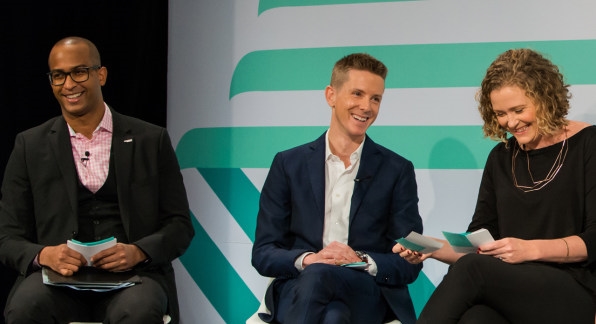Facebook cofounder Chris Hughes has a $2.5 trillion plan to lift up the working class
You may well have seen plenty of headlines about Facebook cofounder Chris Hughes’s recent essay, in which he spelled out the dangers that the social network poses—stifling competition, endangering privacy, controlling speech—while urging the government to break up the company.
But you’re probably less familiar with Hughes’s bigger focus in recent years—his concern about the “winner-take-all economy,” in which companies like Facebook have come to thrive, and he is eager for the government to play a role here, too—putting more cash into more people’s pockets.
Of the two efforts, the latter is much farther along.
Thanks in large part to Hughes, his colleagues, and a network of allies, the idea of substantially boosting tax credits for working people who are struggling to make ends meet has become one of the hottest topics among Democrats on the presidential campaign trail and in state capitals across the country.

[Photo: courtesy Economic Security Project]
“Rapid technological advances, globalization, and financialization are pulling the rug out from under the middle class and lower-income Americans,” Hughes wrote in his 2018 book Fair Shot: Rethinking Inequality and How We Earn. “The same forces that enabled the rise of Facebook, Google, and Amazon have undermined the stability and economic opportunity that most Americans have a right to expect.”
I’d add to that list of forces the decline of unions and a sharp diminishing of worker voice and power; the outsourcing of all manner of labor; the transformation from manufacturing to a knowledge- and service-based economy; and corporate America’s elevation of shareholders above all other stakeholders, including employees.
Whatever you believe is the primary cause, however, there is no doubt about the effect: Even during this current period of low unemployment and decent economic growth, a huge portion of the population is being left behind.
Nearly half of all wage earners today bring in less than $30,000 a year. Last week, the Federal Reserve reported that four in ten Americans don’t have $400 to handle an emergency expense, and 25% of non-retired adults have absolutely no savings or pension to lean on once they stop working. Paying for just the basics, such as rent and medical care, is enormously stressful for many millions—even if they’re employed.
“People feel more strapped and more stretched than ever,” says Gene Sperling, who served as director of the National Economic Council in the Clinton and Obama administrations and has written eloquently about how to further “economic dignity.” “They’re running harder just to stay in place—and they’re questioning whether the basic social compact they bought into is holding up.”
Hughes, who grew up the son of a traveling paper salesman in North Carolina before making a personal fortune at Facebook, has been trying to figure out how to remedy this situation for quite a while. In 2016, he cofounded a nonprofit research and advocacy organization called the Economic Security Project with Natalie Foster, who had earlier launched peers.org to support people who work in the sharing and on-demand economy, and progressive activist Dorian Warren.

“Dreamers and campaigners”
Together, they bring a blend of idealism, policy chops (Hughes described himself to me as “the binder geek” of the trio), and practical experience in actually getting stuff done. “We’re dreamers and campaigners at the same time,” Hughes says.
Their latest campaign, which emerged after an initial focus on providing a guaranteed basic income for all citizens, is built around harnessing the Earned Income Tax Credit, a federal program for low-wage workers that stretches back to the Nixon administration.
Last year, the federal government paid out some $63 billion under the EITC to 25 million people and their families—about $2,500 on average. “It’s a very big deal in terms of the social safety net,” says Elaine Maag, principal research associate at the Tax Policy Center, a joint venture of the Urban Institute and Brookings Institution.
The Economic Security Project would like it to be an even bigger deal. Much bigger.
It is pushing for the EITC to cover 64 million households—two and a half times the present number—reaching more than 150 million men, women, and children. In all, an extra $2.5 trillion in credits would be delivered under this arrangement over 10 years. (That would make it roughly the size of the Trump tax cuts, though those are aimed at fattening the wallets of an entirely different demographic: the rich.)
While the EITC has been increased in the past—generally with bipartisan backing—this plan is far more ambitious than anything contemplated before.
“Incremental isn’t enough anymore,” says Adam Ruben, the Economic Security Project’s point person on the EITC, noting that compensation has pretty much been stagnant for the vast majority of American workers over the past 40 years after adjusting for inflation. (With this in mind, the organization is trying to rebrand the EITC as the “cost-of-living refund.”)
Politicians seem to be getting the message. Among those who have put forward massive EITC expansions are two presidential hopefuls: Sen. Cory Booker with the Rise Credit and Sen. Kamala Harris with the LIFT the Middle Class Act. In addition, Sen. Sherrod Brown and Reps. Ro Khanna and Bonnie Watson Coleman have introduced bills that would double the size of the EITC for working families and multiply it sixfold for childless workers. Meanwhile, a more modest measure from Senate Democrats would still enlarge the EITC by about 25%.
The Economic Security Project has put its imprint on most of this legislation.”The American bargain—that if you work hard, you can get ahead—is in peril,” Booker says. “It’s time to be thinking boldly about what is truly needed to restore the bargain and create real opportunity for working people, and the Economic Security Project is doing just that.”
Not that fulfilling this vision will be easy. Republicans are sure to be wary of anything carrying such a giant price tag, and even Democrats will need to be mindful of certain trade-offs. “This type of major expansion for the EITC could be precisely what a new Democratic president calls for as a replacement for the Trump tax cuts—though they may have to balance that with other priorities like universal healthcare,” says Sperling.

Redefining “work”
Of all the proposals out there, Booker’s most closely mirrors the Economic Security Project’s blueprint. Among other things, it would widen EITC eligibility to $90,000 from $55,000, thereby turning what has historically been an instrument to fight poverty into a tool that would also shore up the middle class. It would improve the credit for workers with no kids from about $500 to $8,000. And perhaps most significantly, it would redefine “work” by making the EITC available to low-income students and those who care for a loved one at home. To pay for all this, Booker says, he would end the preferential tax treatment of capital gains enjoyed by investors.
Also important to the Economic Security Project is giving people the option of a monthly disbursement of the EITC instead of a onetime lump-sum payout. Sen. Booker and Sen. Harris have embraced this feature, which is designed to help cope with a serious problem faced by many: income volatility.
The Economic Security Project has also had an impact among some of the 29 states that have their own version of the EITC, including California, Washington, Illinois, and Maine. “They deserve credit for helping everyone think harder about how the EITC can be innovated,” says Chris Hoene, of the California Budget & Policy Center. “They’ve really helped open up that conversation.”
Not that the Economic Security Project is doing this alone. At both the federal and state levels, it is collaborating with a broad coalition of community groups, think tanks, unions, and others.
What’s more, it has been able to take good advantage of groundwork laid by another organization, Working Hero Action, which is dedicated to promoting the EITC. By holding some 30 poverty forums across Iowa and South Carolina that have attracted most of the Democratic presidential field, Working Hero Action has been able to give the EITC a tremendous degree of visibility.
“We want it to be a centerpiece of the 2020 election,” says Laura Capps, president of Working Hero Action.
Working Hero Action is an offshoot of Golden State Opportunity, a Los Angeles nonprofit that was instrumental in the passage of California’s EITC in 2015 and has helped to win two expansions since then. A third is included in Gov. Gavin Newsom’s latest budget proposal.
Golden State Opportunity’s political success has hinged on its ability to motivate the most credible EITC proponents possible—workers who are actually receiving the credit—to speak directly to lawmakers and others who shape the process.
One of the toughest challenges with the EITC is uptake. Many potential recipients don’t earn enough income to owe any taxes, and so they don’t fill out the necessary paperwork. Others, simply unaware, leave money on the table. The Internal Revenue Service estimates that about 20% of those who could claim the credit fail to do so.
Golden State Opportunity has combated this in California by marketing the EITC through school events, social media, and other channels that have reached millions of people. It then assists workers in accessing the credit through free tax-preparation services offered by United Way and others. Working Hero Action is now replicating this model in other states.

From recipient to change agent
In turn, those who benefit from the EITC are asked to lobby to extend its reach. “We’ve been able to activate the communities we serve,” says Joe Sanberg, the founder of Golden State Opportunity and Working Hero Action. “They become the catalyst for change.”
Take, for instance, Lucy Rincon. The single mother of three was able to chat with the governor’s wife, Jennifer Siebel Newsom, at a Golden State Opportunity gathering in Fresno last March. Rincon, who didn’t know about the EITC until this year, told Newsom how much $5,900 in federal and state credits has meant to her, given that she only made about $9,000 in 2018 as a part-time classroom aide and caregiver.
Rincon used the infusion to buy a laptop and a new king-size bed for her two teenage daughters. Before that, one of them had to sleep on the floor.
She also likes that only those who’ve had a job can file for the EITC. “With a welfare check, you’re just getting money,” Rincon says. “Here, you’ve earned it. You’ve worked for it.”
Rincon is hardly alone in this view. Billionaire Warren Buffet said something along the same lines last month.
That they and many others share this ethic is a key reason that the Economic Security Project has landed on the EITC—at least for now—as the most promising avenue to help those whose financial position is precarious.
When Hughes, Foster, and Warren started out, they were drawn to a different solution: a system in which the federal government would give every person—regardless of how wealthy he or she was—a universal basic income of, say, $1,000 a month.
Hughes had first been exposed to this concept in an international context as a donor to and board member of GiveDirectly, which sends money to East Africans living in abject poverty. Foster had come across UBI as she was looking for ways to cushion the fallout that automation and artificial intelligence threaten to bring to a host of vulnerable workers. And Warren, a political scientist, had long ruminated on Martin Luther King’s championing of a guaranteed income as a vehicle for social and racial justice.
But as they dug in, the odds of seeing a national UBI implemented anytime soon appeared incredibly long. Although studies have indicated that an income guarantee doesn’t deter work, it became impossible to imagine that Washington would go along with a unconditional cash transfer—especially at a time when the Trump administration is trying to attach work requirements to Medicaid and food stamps.

Bettering lives–sooner rather than later
“Yeah, we wanted to explore the really big ideas,” says Warren, “but we also wanted to change people’s lives sooner rather than later.”
Settling on the EITC as an alternative didn’t come in a flash. “There was no epiphany moment,” Hughes says. “That’s not how we work.” Instead, they sought out dozens of experts and eventually saw virtue in building on what was already happening in the tax code.
Among UBI enthusiasts, not everyone is pleased with the shift. “There’s a sense in some quarters that we’re the moderate sellouts,” Warren acknowledges. “We’re not purists.”
He and Foster stress that the Economic Security Project has not abandoned pursuit of a basic income. It is funding an experiment in Stockton, California, in which 100 residents are receiving $500 a month—no strings attached—and another in which 20 African-American mothers living in extreme poverty in Jackson, Mississippi, are being given $1,000 a month.
(These are just a couple of the initiatives that the Economic Security Project has made possible over the past few years—all to the tune of about $7 million. The organization itself runs on about $2 million annually. All of this is enabled by grants from foundations, including Rockefeller and Joyce, and individuals. Hughes is the largest donor.)
“A healthy ecosystem has people thinking about what the world should look like 10 years out and what we can get done in the world today,” Foster says.
Peter Barnes, whose book on a guaranteed income, With Liberty and Dividends for All, has been an inspiration to the Economic Security Project, agrees. Getting to a UBI or something similar “is not going to happen in one leap,” he says. “It’s going to happen in steps. The main thing is to get the ball moving.”
For those in need, after all, cash is cash.
“It’s all about making sure the economy works for everybody,” says Michael Tubbs, the mayor of Stockton. “A basic income is a way to get to that. But the EITC is also a way to get to that. And people are hurting in the here and now.”
(33)



